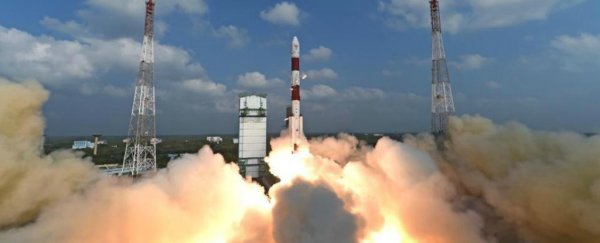The Indian Space Research Organisation (ISRO) managed to launch 104 satellites into space in the span of 18 minutes.
That number nearly triples the previous record of 37 satellites in a single day, which was set by Russia's space agency in 2014.
While traveling at 27,358 km/h (17,000 mph), the Polar Satellite Launch Vehicle (PSLV) rocket released each satellite at a risky interval of just a few seconds.
At that velocity, an incorrect launch path could result in a collision of the satellites, 88 of which were small, 10-pound 'Doves' belonging to Planet Labs. However, all went well in the skies above the Indian Ocean.
This left commercial investors in the space program ecstatic as many companies around the world have come to the ISRO in hopes of a much more cost-effective satellite launch.
Indeed, the organisation is proving much more frugal in comparison to those in the Americas or Europe.
For example, the ISRO launch of a spacecraft to Mars in 2014 cost around US$74 million, while NASA budgeted around US$671 million for its own Mars mission that same year, a difference of almost US$600 million.
ISRO chairman A.S. Kiran Kumar noted that half the costs of the 104 satellite mission were covered by commercial fees, like those paid by Planet Labs.
With satellites becoming easier and cheaper to launch, though, some involved in the space program are worried about a potential increase in space debris.
Most satellite are only in operation for two to three years, so they urge companies and government organisations to take that into consideration when deciding how many satellites to send into space.
This article was originally published by Futurism. Read the original article.
